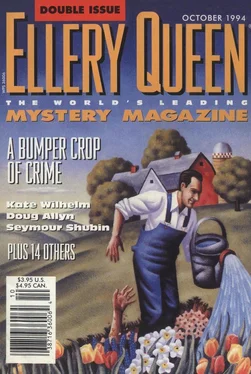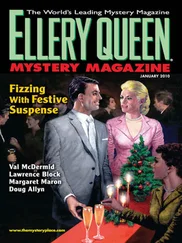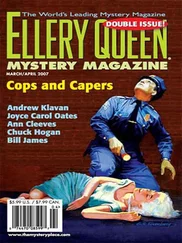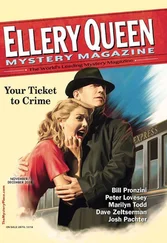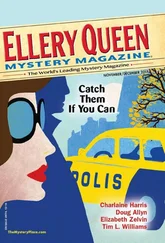Doug Allyn - Ellery Queen’s Mystery Magazine. Vol. 104, No. 4 & 5. Whole No. 633 & 634, October 1994
Здесь есть возможность читать онлайн «Doug Allyn - Ellery Queen’s Mystery Magazine. Vol. 104, No. 4 & 5. Whole No. 633 & 634, October 1994» весь текст электронной книги совершенно бесплатно (целиком полную версию без сокращений). В некоторых случаях можно слушать аудио, скачать через торрент в формате fb2 и присутствует краткое содержание. Город: New York, Год выпуска: 1994, ISBN: 1994, Издательство: Dell Magazines, Жанр: Детектив, на английском языке. Описание произведения, (предисловие) а так же отзывы посетителей доступны на портале библиотеки ЛибКат.
- Название:Ellery Queen’s Mystery Magazine. Vol. 104, No. 4 & 5. Whole No. 633 & 634, October 1994
- Автор:
- Издательство:Dell Magazines
- Жанр:
- Год:1994
- Город:New York
- ISBN:ISSN 1054-8122
- Рейтинг книги:4 / 5. Голосов: 1
-
Избранное:Добавить в избранное
- Отзывы:
-
Ваша оценка:
- 80
- 1
- 2
- 3
- 4
- 5
Ellery Queen’s Mystery Magazine. Vol. 104, No. 4 & 5. Whole No. 633 & 634, October 1994: краткое содержание, описание и аннотация
Предлагаем к чтению аннотацию, описание, краткое содержание или предисловие (зависит от того, что написал сам автор книги «Ellery Queen’s Mystery Magazine. Vol. 104, No. 4 & 5. Whole No. 633 & 634, October 1994»). Если вы не нашли необходимую информацию о книге — напишите в комментариях, мы постараемся отыскать её.
Ellery Queen’s Mystery Magazine. Vol. 104, No. 4 & 5. Whole No. 633 & 634, October 1994 — читать онлайн бесплатно полную книгу (весь текст) целиком
Ниже представлен текст книги, разбитый по страницам. Система сохранения места последней прочитанной страницы, позволяет с удобством читать онлайн бесплатно книгу «Ellery Queen’s Mystery Magazine. Vol. 104, No. 4 & 5. Whole No. 633 & 634, October 1994», без необходимости каждый раз заново искать на чём Вы остановились. Поставьте закладку, и сможете в любой момент перейти на страницу, на которой закончили чтение.
Интервал:
Закладка:
Edvard looked at me with a grim expression. “He must have slipped up here, hid in the trunk, and then the lid fell down. Maybe he was knocked out, and then the lock clicked, and since there was no key to the trunk, he couldn’t open it. Later... they didn’t bother to search hard enough.”
I nodded but was slightly taken aback. “Can locks like that actually click shut?”
He looked at the trunk and the lock and gave a big shrug. “I have no idea. Come on. There’s nothing more we can do up here now. Not today. We’re thirty years too late, Karl.”
He pulled me away and over to the trapdoor.
Halfway down the ladder a new idea occurred to me. “What if — if he sneaked up here alone, then the trapdoor would be open and the ladder would be down, wouldn’t they?”
He walked ahead of me into the living room. There, in the middle of the table, lay a couple of pictures we had put aside: two old, framed photographs of our parents — Dad with his rough, wide face; Mom’s oval face with her hair pinned up.
Their eyes met ours across the table, and I realized that we were thinking the same thing. We remembered our kind but unpredictable father and the violent outbursts of rage he would have if anyone happened to disturb him during his afternoon nap; and how several times he had hit both Edvard and me so hard we could hardly stay on our feet. And we remembered our wise, sensible mother, who had always been so good at covering up whenever he got out of control.
— translated by Stephen Murray
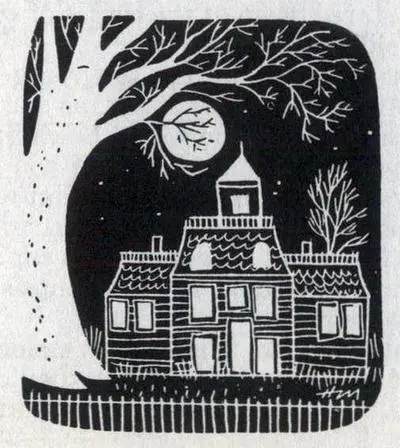
Two Feet of Steel
by Terry Mullins
© 1994 by Terry Mullins
Terry Mullins’s stories often involve the arts or literature in one way or another, hut this derives not only from his having made his career in the arts (the Philadelphian is a retired editor) hut from his addiction to research. His new piece for EQMM deals with one of the hazards that may face a curator of rare and valuable objects ...
As he heard a distant church bell striking twelve midnight, Edward Clipton straightened the pages before him and laid his pen on top of them. His wife had gone to bed an hour earlier and he had promised to follow soon, but he had found several ridiculous errors in the galley proofs of the museum’s forthcoming catalog and correcting them had taken far longer than he had expected.
Stiff and irritated at the printer’s inability to follow simple instructions, he rose from his desk and started across the room. Before he reached his study door, it opened and a masked figure entered pointing a pistol at him. It motioned for silence and for him to turn around. He did so and was quickly blindfolded and gagged. His hands were tied and he was pushed forward.
They went out the front door of his house and he was not permitted to stop until the feel of asphalt was under his feet. He could hear the sound of a car motor running. There was the sound of a door opening and he was shoved into the backseat of an automobile. In moments the car was under way.
The drive was not a long one. When it ended, he was pulled from the car and hurried into a building. Even before the blindfold and gag were removed, he knew where he was. He was in his own museum. Briefly he wondered what had happened to Renelle, the night watchman. In the half darkness of the exhibition room, he found out. The man beside him removed a ski mask and appeared as Renelle himself.
“What do you want?” Clipton asked.
“The Rembrandt, of course,” Renelle replied. Cold, unsmiling, phlegmatic as ever, the watchman led the way to the museum vault.
Dimly the shapes of Dali’s mad fantasies, Demuth’s hard abstractions, Miller’s bloated figures, and Ecter’s flashy constructions appeared and disappeared as Clipton and the night watchman crossed the room and entered a hall hung with Hopper’s stark commentaries on American Victorian buildings and the frozen people who inhabited them.
Renelle opened Clipton’s private office door, ushered him in, and crossed to the museum vault. There he loosed Clipton’s hands.
“How did you know?” Clipton asked.
“I’ve had three months on this job to look at everything on display. There’s a lot of valuable stuff out there, but the Rembrandt’s a copy, an almost perfect copy but a copy just the same. So the real Rembrandt must be in the museum vault. Open it!”
Silently Clipton cursed the board’s folly in cutting costs: one night watchman instead of three, no time locks on doors or vault. It had cost them comparatively little to have a first-rate copier make a reproduction of the only multimillion-dollar painting the museum owned and put it on public display. The original was brought out only on special occasions.
Renelle became impatient. “Open it!”
Clipton approached the computer keyboard reluctantly. He tapped out the entry number and then spun the computerized dials. He opened the huge steel door. Inside a light came on automatically, giving the first clear illumination Clipton had seen since he left his home.
Renelle quickly found the wooden case containing the Rembrandt. He thrust Clipton into a comer of the vault, left with the painting, and shut and locked the vault. Suddenly Clipton was in complete darkness, the afterimage of the vault’s light still dancing in his brain. He blinked, but it did no good. He rubbed the places on his face and wrists where the bonds had left throbbing indentations. He could feel no cuts. Apparently he was undamaged.
He pushed at the vault door without result. Two feet of steel door refused to budge. Then he settled down to wait. The air conditioning which kept temperature and humidity even in the vault should keep him from suffocating, so he expected nothing more than boredom and frustration.
But the absolute darkness did not permit boredom. Clipton had always considered himself a night person. He liked to walk out under the night sky in the country or sit on the roof of his Manhattan apartment and watch the dark shapes of transcontinental jets pass across the velvet canopy that even lights of the metropolis couldn’t paint. But absolute blackness was another matter. He had never felt so cut off from all that was human.
He opened and closed his eyes. As the darting images of retinal shock subsided, a feeling of helplessness gripped him. He couldn’t come to terms with the fact that it didn’t matter if his eyes were open or shut. It was one thing to have a blindfold holding his eyelids shut. Psychologically, it was another matter altogether to open one’s eyes and see nothing, nothing at all.
Over a lifetime, he had become accustomed to the change from darkness to light — some light at any rate — which accompanied opening his eyes. To have that not happen was like having the laws of the universe suspended. He tried to quit blinking. He tried to ignore the darkness. There was nothing he could do for another six hours at least.
He might as well sleep. Take advantage of the dark. Close his eyes and sleep. But why close his eyes? The whole point of closing one’s eyes is to shut out the disturbing stimulus of light. It would be a mockery to shut his eyes to help him sleep in here.
All right, keep them open and go to sleep. That proved to be impossible. He was too conditioned to going to sleep with his eyes closed. So close them and go to sleep. Absolute darkness and absolute silence should put him to sleep quickly.
But there wasn’t absolute silence. The steady but muffled whir of the air-conditioning motors penetrated the vault. It was, of course, a reassuring sound, but it soon became an annoying sound. What if they stopped? The vault was small. There might be four hours’ supply of air but never six. And if they stopped, could he stand absolute silence as well as absolute darkness?
Читать дальшеИнтервал:
Закладка:
Похожие книги на «Ellery Queen’s Mystery Magazine. Vol. 104, No. 4 & 5. Whole No. 633 & 634, October 1994»
Представляем Вашему вниманию похожие книги на «Ellery Queen’s Mystery Magazine. Vol. 104, No. 4 & 5. Whole No. 633 & 634, October 1994» списком для выбора. Мы отобрали схожую по названию и смыслу литературу в надежде предоставить читателям больше вариантов отыскать новые, интересные, ещё непрочитанные произведения.
Обсуждение, отзывы о книге «Ellery Queen’s Mystery Magazine. Vol. 104, No. 4 & 5. Whole No. 633 & 634, October 1994» и просто собственные мнения читателей. Оставьте ваши комментарии, напишите, что Вы думаете о произведении, его смысле или главных героях. Укажите что конкретно понравилось, а что нет, и почему Вы так считаете.
